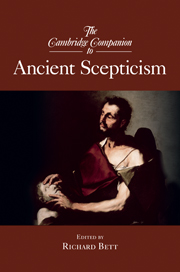Book contents
- Frontmatter
- Introduction
- Part I Origins and Development
- Part II Topics and Problems
- 7 Scepticism and belief
- 8 Scepticism and action
- 9 Scepticism and ethics
- 10 Academics versus Pyrrhonists, reconsidered
- 11 The Pyrrhonian Modes
- 12 Pyrrhonism and medicine
- 13 Pyrrhonism and the specialized sciences
- Part III Beyond Antiquity
- Bibliography
- Index
- Index Locorum
10 - Academics versus Pyrrhonists, reconsidered
from Part II - Topics and Problems
Published online by Cambridge University Press: 28 March 2010
- Frontmatter
- Introduction
- Part I Origins and Development
- Part II Topics and Problems
- 7 Scepticism and belief
- 8 Scepticism and action
- 9 Scepticism and ethics
- 10 Academics versus Pyrrhonists, reconsidered
- 11 The Pyrrhonian Modes
- 12 Pyrrhonism and medicine
- 13 Pyrrhonism and the specialized sciences
- Part III Beyond Antiquity
- Bibliography
- Index
- Index Locorum
Summary
When I first wrote a paper about the difference between Academic and Pyrrhonist Sceptics a long time ago, I was less interested in the differences than in the commonalities. My point was to get away from the Humean distinction between moderate Academics and radical Pyrrhonists. I argued that both were radicals - not, as they came to be seen in early modern times, dogmatists who denied the possibility of knowledge more or less generally, but in the ancient sense of having no philosophical doctrines. They used the same method of arguing for and against any given thesis or belief, declaring the debate undecided, and suspending judgement. The “mitigated” sceptic, who believes that nothing can be known though one may have more or less well-founded opinions, was a figure invented by Carneades in order to refute the dogmatists' objection that suspension of judgement on all matters will make life impossible. Ironically, this figure later became the model of modern versions of scepticism.
Up to this point I still think I was right - at least as far as the early sceptical Academics Arcesilaus and Carneades were concerned. Arcesilaus argued that, given their conception of knowledge and wisdom, the Stoics themselves ought to suspend judgement on all matters. Carneades offered an alternative epistemology to counterbalance the impressive Stoic theory. But these philosophers did not maintain that they were right and the Stoics wrong, or that one should accept their own proposal. The only salient difference that seemed to me to be left between those Academics and their Pyrrhonist successors was the curious claim of the Pyrrhonists that their so-called “way of life” would lead to the goal that other Hellenistic schools were also endorsing – tranquility.
- Type
- Chapter
- Information
- The Cambridge Companion to Ancient Scepticism , pp. 195 - 207Publisher: Cambridge University PressPrint publication year: 2010
- 12
- Cited by



